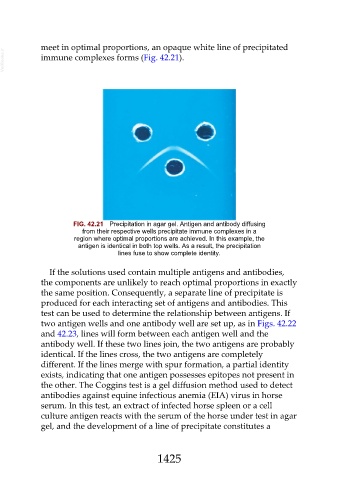Page 1425 - Veterinary Immunology, 10th Edition
P. 1425
meet in optimal proportions, an opaque white line of precipitated
VetBooks.ir immune complexes forms (Fig. 42.21).
FIG. 42.21 Precipitation in agar gel. Antigen and antibody diffusing
from their respective wells precipitate immune complexes in a
region where optimal proportions are achieved. In this example, the
antigen is identical in both top wells. As a result, the precipitation
lines fuse to show complete identity.
If the solutions used contain multiple antigens and antibodies,
the components are unlikely to reach optimal proportions in exactly
the same position. Consequently, a separate line of precipitate is
produced for each interacting set of antigens and antibodies. This
test can be used to determine the relationship between antigens. If
two antigen wells and one antibody well are set up, as in Figs. 42.22
and 42.23, lines will form between each antigen well and the
antibody well. If these two lines join, the two antigens are probably
identical. If the lines cross, the two antigens are completely
different. If the lines merge with spur formation, a partial identity
exists, indicating that one antigen possesses epitopes not present in
the other. The Coggins test is a gel diffusion method used to detect
antibodies against equine infectious anemia (EIA) virus in horse
serum. In this test, an extract of infected horse spleen or a cell
culture antigen reacts with the serum of the horse under test in agar
gel, and the development of a line of precipitate constitutes a
1425

